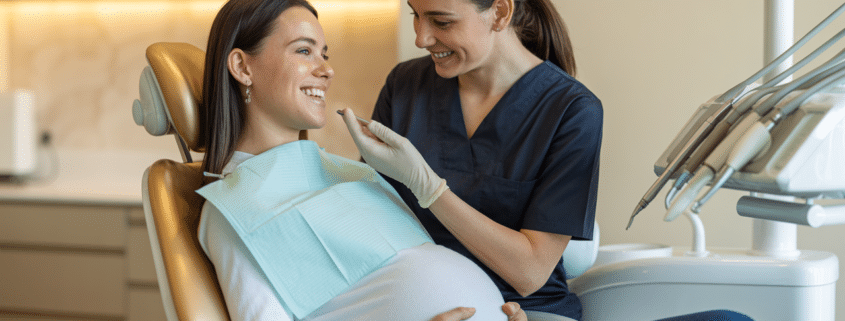How Pregnancy Affects Your Oral Health—and Vice Versa
Pregnancy changes just about everything—your hormones, your sleep schedule, even your snack cravings. But what many people don’t realize is that it can also take a serious toll on your mouth. From swollen gums to increased risk of cavities, pregnancy has a profound impact on your oral health—and your oral health can, in turn, affect your pregnancy.
This isn’t just about bleeding gums or a sore jaw. Studies have linked poor oral health to pregnancy complications like premature birth and low birth weight. That’s why expecting mothers should make oral care a priority—not just for themselves, but for their baby’s health, too.
TLDR – Quick Guide
- Pregnancy and Oral Health: Hormones can lead to gum inflammation, tooth decay, and more.
- Key Risks: Pregnancy gingivitis, enamel erosion, cavities, and pregnancy tumors.
- Why It Matters: Poor oral health has been linked to premature birth and other complications.
- Dental Care is Safe: Routine checkups and cleanings are recommended during pregnancy.
- Big Picture: A healthy mouth supports a healthy pregnancy—and a healthy baby.
Detailed Breakdown
What Happens to Your Mouth During Pregnancy?
Your body isn’t the only thing going through changes. Here’s what can shift in your mouth while pregnant:
- Increased Hormones: Estrogen and progesterone levels skyrocket, causing gums to become more sensitive and inflamed.
- Pregnancy Gingivitis: Up to 70% of pregnant women experience gum redness, swelling, and bleeding.
- Higher Risk of Cavities: Cravings for carbs and sweets, plus frequent snacking, can feed cavity-causing bacteria.
- Enamel Erosion: Morning sickness and frequent vomiting introduce stomach acid into the mouth, which weakens enamel.
- Pregnancy Tumors: These are non-cancerous growths on the gums that can appear during the second trimester.
These symptoms might seem like no big deal, but ignoring them can lead to more serious issues like periodontitis (advanced gum disease).
How Oral Health Impacts Pregnancy
It’s a two-way street. Just as pregnancy affects your mouth, your oral health can influence your pregnancy outcome.
- Periodontal Disease and Preterm Birth: Several studies suggest a link between untreated gum disease and increased risk of premature birth or low birth weight.
- Bacteria and Inflammation: Gum infections can release inflammatory markers and bacteria into the bloodstream, potentially affecting the placenta.
- Tooth Decay Transmission: Cavity-causing bacteria can be passed from mother to baby, especially after birth through shared utensils or kisses.
A study published in the Journal of the American Dental Association found that pregnant women with gum disease are up to 7 times more likely to deliver prematurely than women with healthy gums.
Is Dental Care Safe During Pregnancy?
Absolutely. In fact, routine dental visits are recommended during pregnancy, especially during the second trimester. Here’s the breakdown:
- First Trimester: It’s safe to get checkups and cleanings. Inform your dentist about your pregnancy.
- Second Trimester: This is the best time for dental work (cleanings, fillings, etc.) as the risk is lowest.
- Third Trimester: Treatment is still safe, but lying on your back for long periods may be uncomfortable.
Dentists will avoid X-rays and certain medications during pregnancy unless absolutely necessary—but don’t skip the visit.
How to Protect Your Oral Health While Pregnant
- Brush Twice a Day: Use fluoride toothpaste and don’t slack, even if you’re exhausted.
- Floss Daily: Keeps gums healthy and prevents gingivitis.
- Rinse After Vomiting: Use a mixture of water and baking soda to neutralize acid.
- Snack Smarter: Limit sugar and opt for teeth-friendly options like cheese, apples, and yogurt.
- Visit Your Dentist: Get a checkup and professional cleaning during your second trimester.
- Manage Morning Sickness: Ask your OB about safe ways to minimize acid reflux and vomiting.
If your gums bleed, don’t panic—but don’t ignore it either. Bleeding gums are common during pregnancy but need monitoring to prevent complications.
Key Takeaways
- Pregnancy affects your oral health due to hormone fluctuations and lifestyle changes.
- Common issues include gum inflammation, cavities, enamel erosion, and pregnancy tumors.
- Poor oral health can negatively impact pregnancy outcomes, including preterm birth.
- Dental care during pregnancy is safe and essential—don’t skip the checkups.
- Taking care of your teeth supports both your health and your baby’s well-being.
FAQs
Can I get dental X-rays while pregnant?
Generally, X-rays are postponed unless absolutely necessary. If required, your dentist will use a lead apron and minimize exposure.
Why do my gums bleed more during pregnancy?
Hormonal changes increase blood flow to gum tissues, making them more sensitive and prone to bleeding.
What if I need a dental procedure while pregnant?
Routine procedures like fillings and cleanings are safe. Urgent treatments should not be delayed.
How can I protect my teeth from morning sickness?
Rinse with a baking soda and water solution after vomiting to neutralize acid before brushing.
Is fluoride safe during pregnancy?
Yes. Fluoride toothpaste and professional treatments are safe and help prevent tooth decay.




Leave a Reply
Want to join the discussion?Feel free to contribute!